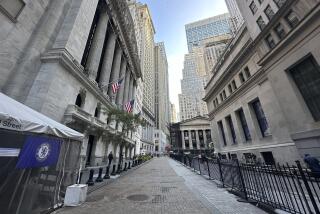No Time for Retreat, Thatcher Says - Britain: After 10 years in power, the prime minister declares victory for Conservative polices, even though her popularity is taking a nose dive.
- Share via
BLACKPOOL, England —
Prime Minister Margaret Thatcher claimed spiritual parenthood Friday of the political revolution sweeping Eastern Europe and promised Conservative Party leaders that her government will not compromise its anti-socialist principles because of setbacks in the opinion polls.
Eager to direct her nation’s attention away from a spate of bad economic news, Thatcher delivered a “back-to-the-basics” closing address to 3,500 delegates at what was called a pivotal party conference after a decade in power.
“In 1979, we knew that we were starting a British revolution,” she said. “In fact, we were the pioneers of a world revolution.
“We did not know it at the time, but the torch we lit in Britain, which transformed our country--the torch of freedom that is now the symbol of our party--became the beacon that has shed its light across the Iron Curtain into the East. The messages on our banners in 1979--freedom, opportunity, family, enterprise, ownership--are now inscribed on the banners in Leipzig (East Germany), Warsaw, Budapest and even Moscow.”
The Conservatives came to their annual conference reeling from a series of economic and political setbacks that have seen their standing in the public opinion polls drop sharply. The latest polls, published Friday, showed them trailing the rival Labor Party by 9.5%.
These were the first polls since Labor officially moderated its socialist platform at its annual conference earlier this month in Brighton.
Thatcher repeatedly cast doubt on Labor’s sincerity and painted the main opposition party as out of step with world history--a theme the Conservatives are likely to emphasize in the unofficial campaign, already under way, leading up to general elections expected as early as next year.
“Labor’s real prescription for Britain is the disease half the world is struggling to cure,” Thatcher said.
Meanwhile, her Conservatives are meeting “head-on the real issues of the day,” she said, adding: “Not for us disposable ideals. Not for us throwaway conviction. Not for us rent-a-principle.”
Thatcher, who observed her 64th birthday Friday, is not as dynamic a public speaker as Labor Party leader Neil Kinnock, or others in her own party, but she received a 10-minute standing ovation that included a rousing rendition of “Happy Birthday.”
“Ten more years!” the foot-stomping delegates shouted as Thatcher gathered her Cabinet members around her and pointed to a huge sign overhead describing them as “the right team for Britain’s future.”
Thatcher’s speech had been seen as particularly important in light of nervousness in the party’s ranks over recent developments. Party Treasurer David Kelly urged the delegates to begin replenishing Conservative coffers for the next election.
“My friends, we have got a fight on our hands,” he said.
Party Chairman Kenneth Baker, in an aggressive speech that opened the conference, said, “This is not the time for fretting over opinion polls.”
The decline in the Conservatives’ standing coincides with the government’s pursuit of some of the most controversial legislation of the Thatcher era. It includes the planned privatization of the country’s water and electric power utilities, reform of the national health service and a shift to a regressive head tax.
What was clearly most worrisome to the delegates, however, was mounting evidence of serious trouble in an area where Thatcher has claimed her greatest triumphs: the economy.
To make matters worse, it was announced just hours before Thatcher’s speech that the rate of inflation, already the highest in any of the major industrial powers, increased by 0.2% last month to 7.6%.
The British pound has fallen by about 10% against the German mark and the U.S. dollar since the first of the year. Even though this fall makes British exports cheaper and imports of foreign goods more expensive, the country’s trade deficit is running at a record rate.
The government has chosen the interest rate as its primary weapon against inflation, hoping that a higher cost of credit will discourage borrowing and thus reduce consumer demand. It is a controversial choice, but one for which there is no alternative, Chancellor Nigel Lawson argued this week.
Lending rates have been raised a dozen times in the last 15 months. The latest increase, announced last week after a similar move by the German banks, was to a punishing 15%.
High interest rates have had a powerful impact on two groups regarded as important segments of the Conservative Party’s natural constituency--homeowners and business leaders--so the delegates had reason to fret. Monthly payments on a typical, $120,000 mortgage have shot up by more than 40%, or about $380, since the spring of 1988.
Thatcher defended her chancellor Friday and predicted that high interest rates will succeed in reducing inflation, “as (they have) in the past.” Industry, she warned, “must not expect to find refuge in a perpetually depreciating currency. Only by steadily improving efficiency will we win and keep our share of the world’s markets.”
She promised to pay increasing attention to the environment, but ridiculed people who advocate “that we go back to some simple village life.”
“It’s prosperity which creates the technology that can keep the Earth healthy,” she said, and then went on to conclude: “The decade and the century which open up before us must see the lasting triumph of liberty, our common cause. The world needs Britain--and Britain needs us--to make that happen.”
More to Read
Sign up for Essential California
The most important California stories and recommendations in your inbox every morning.
You may occasionally receive promotional content from the Los Angeles Times.













